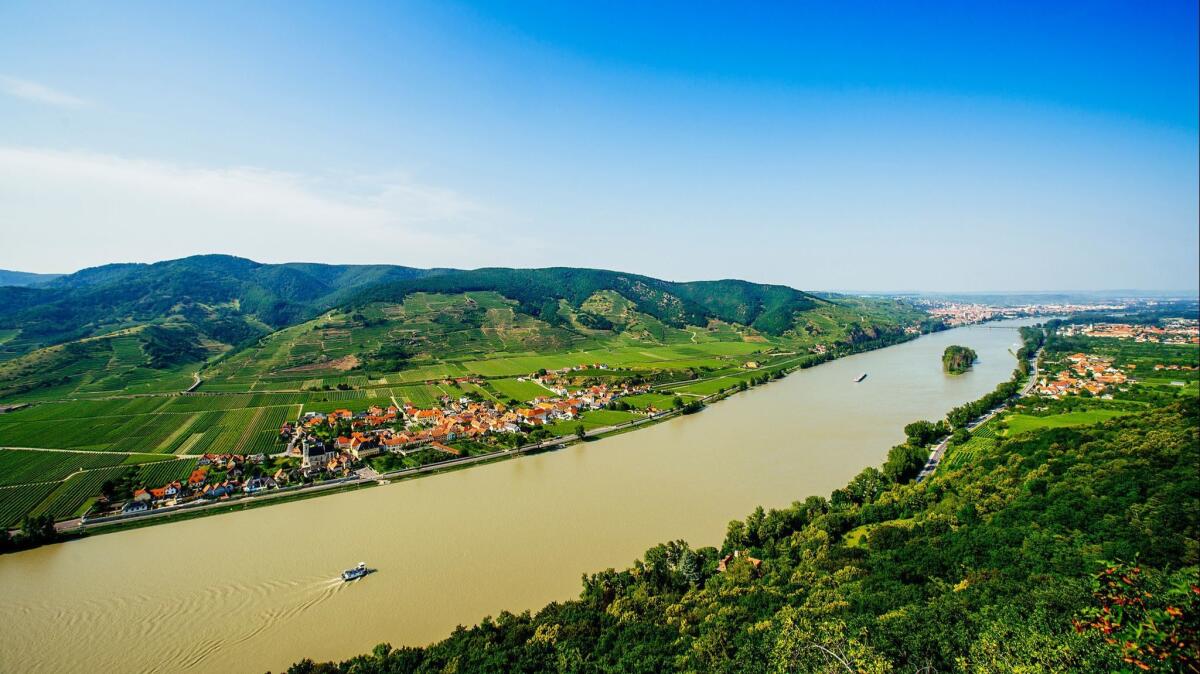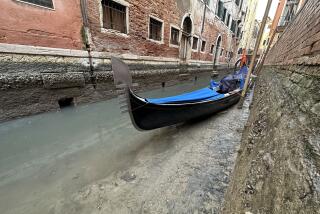River cruises on the Danube reached a low point this summer, but things may be looking up

California isn’t the only place that’s suffering from drought. Just ask anyone who planned to take a Danube River cruise in Central Europe in August.
Hot summer weather and a scarcity of rain caused the river, one of Europe’s most popular, to drop to such lows that many riverboats couldn’t sail on parts of it.
Passengers’ long-anticipated vacations were beset by delays, confusion and extended hotel stays. In some cases, travelers saw their destinations by bus instead of riverboat. In others cases, they sailed part of their itinerary on one riverboat, disembarked and were bused to another riverboat that could sail where the water level was higher.
Many cruises on the Danube and other rivers were canceled outright, some at the last minute.
Do this summer’s weather problems mean you should steer clear of river cruises?
Not necessarily. Weather can affect any vacation, and it would be a shame to deprive yourself of this form of transportation, which offers a comfortable way to explore Europe at a leisurely pace while the world drifts by.
But the drought means passengers should consider the time of year when they schedule cruises. Summer and early fall months, for instance, are more likely to experience problems caused by low water. Spring cruises can suffered from the opposite issue: High water means boats can’t get under low bridges.
Another solution: Book cruises on rivers that haven’t had problems. Cruises in France, for instance, weren’t seriously affected by this summer’s dry conditions. CroisiEurope Cruises’ Bordeaux itineraries — the Gironde estuary and the Garonne and Dordogne rivers — have been fine, said John McGlade, the line’s North American general manager.
“They are coastal and tidal, and much more predictable than inland rivers,” he said.
For the river cruise industry, the disrupted and canceled trips have been a public relations issue not unlike outbreaks of gastrointestinal illness on ocean liners and mean-spirited treatment of passengers on airlines.
Industry executives say the problem is resolving itself, thanks to a change in the weather that has reduced the need for busing and cancellations.
“There was some good rain, and the temperatures cooled down,” said Rudi Schreiner, president and co-owner of AmaWaterways, which sails 600 cruises a year in Europe, carrying about 80,000 passengers.
“I feel more peaceful.” Schreiner said. “We are good for the next couple of weeks.”
Of additional concern are the upcoming holiday market river trips in December, most of which focus on the Danube River cities of Passau, Nuremberg and Regensburg, Germany; Vienna; and Budapest, Hungary.
Tom Armstrong, communications manager for Tauck, a high-end tour company that specializes in land and river trips, is hopeful but not ready to make predictions.
“It’s simply too early to tell what, if any, impacts there will be on trips this fall and winter,” he said. “It’s entirely possible that a good rain or two will address any concerns.”
Tauck canceled one departure, Armstrong said. “The most common impacts have been instances where guests would move to another Tauck riverboat on the far side of the low-water area,” he said.
The company posted an appropriate video on its website called “River Gods” about the fickleness of weather.
Two cruisers who contacted The Times Travel section were upset because they weren’t told in advance that their cruises might be affected by water levels.
Neither was sailing on AmaWaterways, but Schreiner tried to explain why early notifications or cancellations aren’t always feasible.
The weather may change, bringing rain, he said. Also, “If you cancel four or five days before departure, what would a passenger then do? Sit at home? It’s too hard to plan anything else at the last minute. My thought is: ‘Why don’t I take them on a cruise, give them the best vacation I can and give them a future cruise credit?’”
Ama’s reimbursement/voucher plan is liberal, giving cruisers a 15% credit for each day their itinerary deviates significantly. It also has a cancellation/full cruise credit protection plan that costs $60 to $80 per passenger.
“If you spend $10,000, you get a $10,000 credit,” he said.
Some cruise lines are less liberal.
In that case, Colleen McDaniel, senior executive editor of CruiseCritic.com, recommends buying travel insurance and familiarizing yourself with the plan.
“For added protection, purchasing a plan with ‘cancel-for-any-reason’ coverage could be a worthy investment,” she said.
More to Read
Sign up for The Wild
We’ll help you find the best places to hike, bike and run, as well as the perfect silent spots for meditation and yoga.
You may occasionally receive promotional content from the Los Angeles Times.






